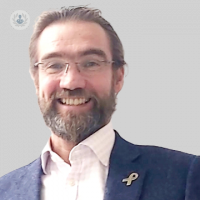Tomorrow’s medicines today: Clinical trials for breast cancer drugs
Autore:In this article, revered consultant medical oncologist and breast cancer specialist Professor Andrew Wardley shares his expert insight on what is involved in clinical trials for breast cancer drugs and how they have advanced treatment and outcomes for patients. The renowned specialist also sheds light on the benefits of participating in clinical trials and how patients can access them.
What types of clinical trials are available for breast cancer?
There are lots of clinical trials available for breast cancer - from early clinical trials looking at how new treatments might possibly become beneficial to later phase clinical trials where drugs are tested against the best current standard with the aim to get licenced for treatment. Thereafter, trials may look to optimise treatment options.
Who can access clinical trials for breast cancer treatment?
There are clinical trials for nearly every setting for patients with breast cancer. Certainly in the practice that I set up twenty years ago, the intention was to have a clinical trial for every patient: to answer questions relevant to each patient in a their particular situation. This was very successful establishing the highest recruiting team to clinical trials for breast cancer drugs in cancer in Europe for quite period of time.
How can patients know if a clinical trial is right for them?
Participating in clinical trials is very important for patients. If you are interested in a clinical trial, you can ask your doctor. If your doctor doesn’t know about clinical trials, there are ways to access them on the internet or through cancer charities or research organisations within your country. If want to take part, you should be able to do so. Having access to clinical trials is a right that everyone should have. Clinical trials are very important because this is how new treatments are developed. I have been involved in clinical trials for over twenty years and have seen many patients benefit from treatments within those trials before they become licensed drugs. Participating in clinical trials can mean that you get access to tomorrow’s medicines today.
How long do clinical trials for breast cancer last?
Clinical trials last as long as is necessary to get the results required to answer the question being asked in the trial. Randomised trials are generally run on event rate meaning a number of events need to happen in each arm of the treatment to show whether the treatment has been effective or not. Trials earlier in drug development may be single arm, often looking at drug safety. These can sometimes lead to approval for licensing if the results are outstanding.
What is the biggest breakthrough in breast cancer treatment which has resulted from a clinical trial?
There have been so many breakthroughs in breast cancer that it’s hard to choose just one. I am very pleased to have been so involved in the development of many targeted therapies. From the time I began practising in breast cancer medicine in 2001 to present, HER2-positive breast cancer has probably gone from being the worst type of breast cancer you can have to the best because the treatments are now so effective. Throughout my career, I have been involved in the most of the important drugs, including Trastuzumab (Herceptin™), trastuzumab-emtansine (Kadcyla™), and pertuzumab (Perjeta™), trastuzumab-deruxtecan (Enhertu™), tucatinib (Tukysa™) amongst others. There is a whole host of drugs in use today, each of which has made a massive difference to patients’ quality of life as well as helping them to survive their breast cancer, if treatment is given early enough.
If you are seeking treatment for breast cancer and wish to schedule a consultation with Professor Wardley, you can do so by visiting his Top Doctors profile.



